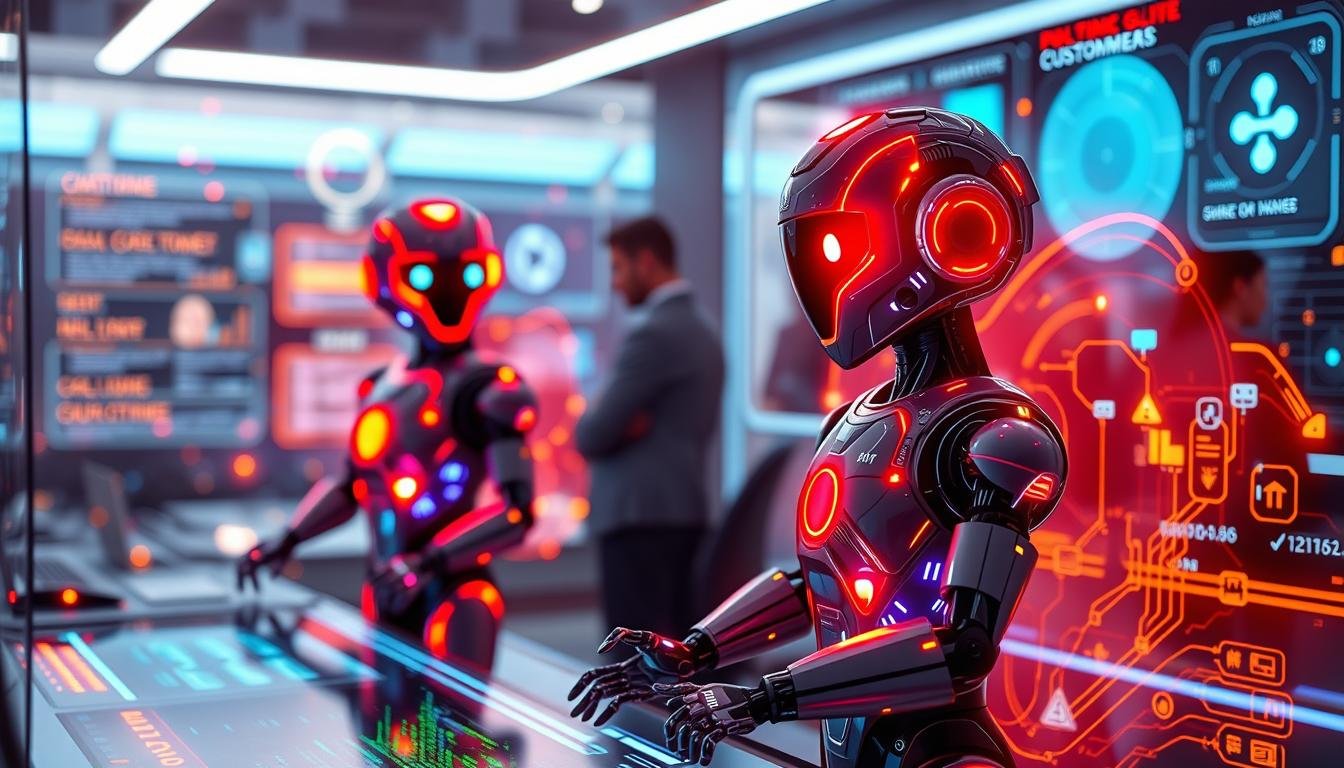In today’s world, fast internet is key. It’s needed for streaming, video calls, and web browsing. Slow speeds can be really annoying. But don’t worry, I’ve got some tips to make your internet faster and smoother.
Key Takeaways
- Understand the factors that affect internet speed and how to optimize your network
- Learn how to clear your browser cache and cookies for improved performance
- Discover techniques to optimize your router settings and choose the best wireless channel
- Explore the benefits of using wired connections and limiting bandwidth-hogging activities
- Identify the best ways to troubleshoot internet speed issues and conduct speed tests
Slow downloads, buffering videos, and laggy pages are no match for these tips. You’ll be surfing the web at super-fast speeds in no time. Let’s get started and make your internet connection the best it can be!
Understanding Internet Speed
Before we explore ways to boost your internet speed, let’s first understand what it is. Internet speed is how fast data moves between your device and the internet. It’s usually measured in megabits per second (Mbps).
What is Internet Speed?
Internet speed shows how quickly data moves from the internet to your device. It has two main parts: download and upload speeds. Download speed is how fast you get info from the internet, like web pages or videos. Upload speed is how quickly you send data, like photos or videos online.
Factors Affecting Internet Speed
Many things can change your internet speed. Here are some:
- Your internet plan and the speed package you’ve subscribed to
- The quality and age of your network equipment, like your router and modem
- The distance between your device and the router, and any obstacles
- The number of devices connected to your network and their bandwidth usage
- Your location and the local internet infrastructure
- The websites or online services you’re using and their server performance
Knowing these factors impacting internet speed helps you make the most of your connection. It also shows where you might need to make improvements.
Optimizing Your WiFi Network
Boosting your internet speed is easier than you think. It starts with optimizing your wireless network. A few simple steps can greatly improve your wifi network’s performance.
First, let’s talk about wifi network optimization. Where you place your router matters a lot. Don’t put it in corners or near thick walls, as these can block the signal. Instead, place it in the center of your home or office for better coverage.
Next, let’s look at wireless speed improvement. Cutting down on interference is key. Look for and remove any sources of interference, like microwaves or cordless phones. You can also try switching your wifi channel to find a less crowded one.
Finally, for wireless troubleshooting, managing devices is important. Too many devices can slow down your network. Ask family members to disconnect unused devices. Also, consider getting a router that can handle more connections.
By following these easy steps, you can make your wifi network much better. You’ll enjoy faster internet speeds. It’s a quick and simple way to improve your internet at home or in the office.
| Tip | Description |
|---|---|
| Router Placement | Position your router in a central, open area to maximize coverage and minimize interference. |
| Reduce Interference | Identify and eliminate sources of interference, such as microwaves and neighboring wifi networks. |
| Manage Connections | Limit the number of connected devices to prevent network congestion and slow speeds. |
By following these tips, you can make your wifi network faster and more reliable. Enjoy a better internet experience.
Upgrading Your Internet Plan
If your current internet plan isn’t fast enough, it’s time to think about upgrading. Start by figuring out how much bandwidth your household needs. This depends on the number of devices, how much streaming you do, and your online activities. Knowing this will help you pick the right internet plan.
Assessing Your Bandwidth Needs
Look at how much internet you use every day. Think about how many devices you connect at once, how often you stream videos, and if you do any online gaming or work. Evaluating your internet bandwidth requirements will help you choose the best plan for your family.
Comparing Internet Service Providers
- Research different internet service providers (ISPs) in your area and compare their available plans.
- Look at the download and upload speeds, data caps, and pricing to find the best value for your budget and usage.
- Consider factors like customer service, reliability, and coverage area when selecting an ISP.
Upgrading your internet plan can greatly improve your browsing experience. By figuring out your bandwidth needs and comparing ISPs, you can find the perfect plan. This will keep your household connected and productive.
“Reliable, high-speed internet is essential in today’s digital world. Don’t settle for a plan that can’t keep up with your household’s demands.”
How to Boost Your Internet Speed: Practical Tips for Faster Browsing
Are you tired of slow internet speeds? You’re not alone. There are many ways to make your internet faster. I’ll share some top tips to help you get the most from your connection.
Start by clearing your browser cache and cookies. This simple step can make your internet speed better. Just go to your browser settings and choose “Clear cache and cookies.”
Also, disable any browser extensions or plugins you don’t need. These can slow down your internet. Check your extensions and turn off any you don’t use.
- Optimize your router settings by changing the WiFi channel or updating the firmware. This can help ensure your network is running at peak efficiency.
- Consider using a wired connection instead of WiFi. Ethernet cables often provide faster and more stable internet speeds, especially for tasks that require high bandwidth.
- Limit bandwidth-hogging activities, such as streaming high-definition video or downloading large files, during peak usage times. This can help ensure that the available bandwidth is distributed evenly across all devices on your network.
By using these internet speed boosting tips and internet optimization techniques, you can browse the web faster. The key is to try different strategies to find what works best for you.
“The internet is the most important single development in the history of human communication since the invention of call waiting.” – Dave Barry
Clearing Browser Cache and Cookies
Boosting your internet speed is easy by clearing your browser’s cache and cookies. This action removes outdated or accumulated browsing data. It’s good for your web browsing experience.
Why Clear Cache and Cookies?
Your browser’s cache stores temporary files to make web pages load faster. But, it can get cluttered over time. This slows down your browsing.
Cookies, small text files from websites, also slow you down if they pile up. Clearing your cache and cookies regularly frees up space. It makes your browsing faster and smoother.
Clearing your cache and cookies is simple but effective. It boosts your internet speed and makes browsing more enjoyable. Regular maintenance is key to a better web experience.
Disabling Browser Extensions
Browser extensions can be both good and bad. They add useful features but can slow down your internet. We’ll look at how to manage them to improve your speed optimization and web browsing performance.
Too many extensions can make your browser slow. Each one can slow down your browser, affecting your browser extensions management. It’s important to find a balance between useful extensions and fast internet.
- Check your extensions: Look at the extensions you have. Remove any you don’t use or need.
- Choose important extensions: Pick the ones that really help you. Keep these, but watch how they affect your system.
- Use extension managers: Many browsers have tools to manage extensions easily. Use these to keep your extensions in check.
- Try disabling extensions: If your browser is slow, try disabling some extensions. This can help you find the problem.
Managing your browser extensions can make your internet faster. A good set of extensions can improve your browsing. But too many can slow you down.
| Extension Name | Description | Impact on Performance | Recommended Action |
|---|---|---|---|
| Grammarly | Grammar and spelling checker | Moderate | Keep active, as it can improve writing quality |
| Ad Blocker | Blocks online advertisements | High | Keep active, as it can significantly improve browsing speed |
| Image Optimizer | Compresses images on web pages | Low | Keep active, as it can enhance page loading times |
| Social Media Sharing | Enables social media sharing from web pages | Moderate | Disable if not frequently used, as it can impact performance |

This quote shows why managing browser extensions is important. By choosing the right ones, you can have a better browsing experience. This improves your web browsing performance and speed optimization.
Optimizing Router Settings
Your router is key to your home network’s speed. By tweaking your router settings, you can make browsing faster and connectivity smoother. Focus on adjusting your WiFi channel and updating your router’s firmware.
Changing WiFi Channel
The WiFi channel your router uses affects your network’s speed. Some channels may be too crowded, causing interference and slower speeds. To improve your router settings, try different WiFi channels to find the best one for your space:
- Log into your router’s admin interface.
- Find the wireless settings section and look for the channel change option.
- Test different channel numbers like 1, 6, or 11 and check your speed.
- Pick the channel that gives you the fastest and most stable internet.
Updating Router Firmware
Keeping your router’s firmware current is vital for faster speeds. Manufacturers often update firmware to fix issues, boost security, and add new features. Here’s how to update your router’s firmware:
- Visit your router manufacturer’s website for the latest firmware.
- Download the update and follow the manufacturer’s instructions to install it.
- After updating, check your internet speed to see if it’s improved.
Optimizing your router settings can greatly enhance your internet speed. Take the time to experiment with different settings to find the best for your network.
Using Wired Connections
Wireless internet is popular for its ease of use. Yet, a wired Ethernet connection often offers faster and more reliable speeds. Here, we’ll look at the benefits of wired connections and how to set them up for the best results.
Wired Ethernet connections have a big speed improvement over wireless ones. Ethernet cables can send data much faster. This is great for things like streaming videos, playing games online, or transferring big files.
Another plus of wired internet connections is their reliability. Ethernet cables are less likely to get interrupted by interference. This makes them a solid choice, especially in places with lots of wireless signals or physical barriers.
To enjoy the Ethernet benefits, follow these steps to set up a wired connection at home or in the office:
- Find the Ethernet ports on your router and the devices you want to connect (like desktops, gaming consoles, or smart TVs).
- Buy good-quality Ethernet cables in the right lengths for your setup.
- Plug one end of the Ethernet cable into the router’s Ethernet port and the other into your device’s port.
- Set your device’s network settings to use the wired connection. Make sure it’s the main connection, not wireless.
Using a wired Ethernet connection can make your internet faster and more reliable. Try it out and see how it improves your online activities.
Limiting Bandwidth-Hogging Activities
Our online activities can slow down our internet. Streaming videos, downloading big files, or using video calls can use a lot of bandwidth. This makes our browsing slower. It’s key to know and limit these activities to keep our internet fast.
One good way is to plan when you use a lot of bandwidth. Do big downloads or updates when it’s quiet online. This keeps your regular web use smooth.
Also, make your media use better. Choose lower video quality or use adaptive streaming. For video calls, pick the lowest quality that works for you.
- Don’t do too many things that use a lot of bandwidth at once.
- Ask everyone in your home to think about their internet use and focus on what’s important.
- Think about using bandwidth management tools on your router. They help make sure no one uses too much bandwidth.
Being smart about how you use the internet helps everyone. It makes sure your bandwidth is shared well. This gives a better web experience for everyone on your network.

| Activity | Bandwidth Consumption | Optimization Tip |
|---|---|---|
| Streaming HD video | 3-7 Mbps | Use lower resolutions or enable adaptive bitrate |
| Video conferencing | 1-4 Mbps | Use the lowest possible resolution |
| Large file downloads | Varies | Schedule downloads during off-peak hours |
Using these resource allocation tips helps keep your internet fast. Even when lots of people or things are using it.
Upgrading to a Faster Router
If your internet speeds are still slow, it might be time for a new router. A faster router can greatly improve your wireless performance and internet speed.
Upgrading your router brings many benefits:
- Improved Wireless Performance: New routers support the latest wireless standards. This means faster and more reliable connections for your devices.
- Increased Bandwidth: Faster routers can handle more devices and data-heavy activities. This ensures your internet speed meets your needs.
- Enhanced Connectivity: Newer routers often have advanced features like beamforming and MU-MIMO. These features improve signal strength and reduce interference for a better experience.
When picking a new router, think about your home size, device count, and budget. Look for routers with the latest WiFi standard (WiFi 6). Also, check for features like dual-band or tri-band connectivity, high-speed Ethernet ports, and strong security.
Getting a new router can really change your internet experience. With the right one, you’ll enjoy faster browsing, smoother streaming, and a more reliable network at home.
“Upgrading to a faster router is one of the most effective ways to boost your internet speed and improve your overall wireless performance.”
Troubleshooting Internet Speed Issues
If you’re still dealing with slow internet speeds, it’s time to troubleshoot. Running reliable internet speed tests can find the problem. It might be your network, service provider, or something else.
Running Internet Speed Tests
To really understand your internet speed, you need to run online speed tests from trusted sites. These tests give you insights into your internet speed. They help figure out if the problem is with your provider, equipment, or network setup.
- Visit reliable online speed test websites, such as Speedtest.net or Google’s internet speed test.
- Run the test multiple times, at different times of the day, to get a clear picture of your internet performance.
- Compare the results to the speeds promised by your internet service provider (ISP) to identify any discrepancies.
- If the test results consistently show significantly lower speeds than your plan, it’s time to contact your ISP and troubleshoot the issue further.
| Test | Download Speed (Mbps) | Upload Speed (Mbps) | Latency (ms) |
|---|---|---|---|
| Speedtest.net | 50.2 | 10.4 | 28 |
| Google Speed Test | 48.9 | 9.8 | 31 |
| ISP-Provided Test | 52.1 | 11.2 | 25 |
By running these internet speed troubleshooting tests, you can find the cause of your slow internet. Then, you can take steps to fix it.
“Reliable internet speed tests are crucial for identifying and resolving slow internet performance issues.”
Conclusion
By following the tips in this guide, you’ll boost your internet speed optimization. You’ll enjoy faster, smoother web browsing performance. This will greatly improve your online experience improvement.
Remember, keeping your internet connection in top shape is key. Always check, tweak, and fix any problems. With these tips, you’ll soon be browsing the web at incredible speeds.
Improving your internet speed is a journey, but it’s worth it. Say goodbye to slow websites, long downloads, and annoying buffering. A faster, more reliable internet opens up new digital possibilities for you.
Whether you’re watching your favorite shows, working online, or just browsing, a quicker internet makes a big difference. Try these tips and see how a faster online experience can change your life. Your digital world will be better for it!






